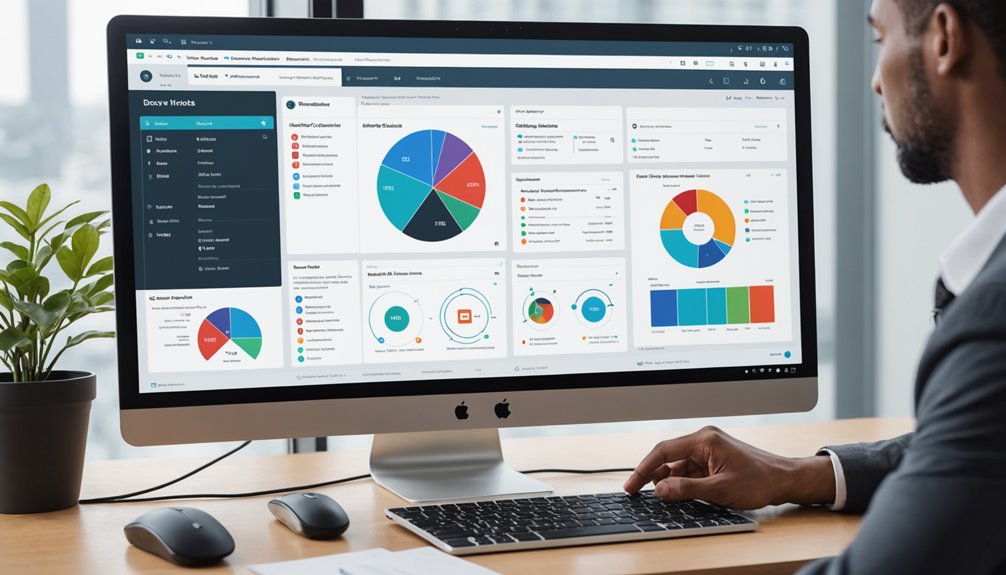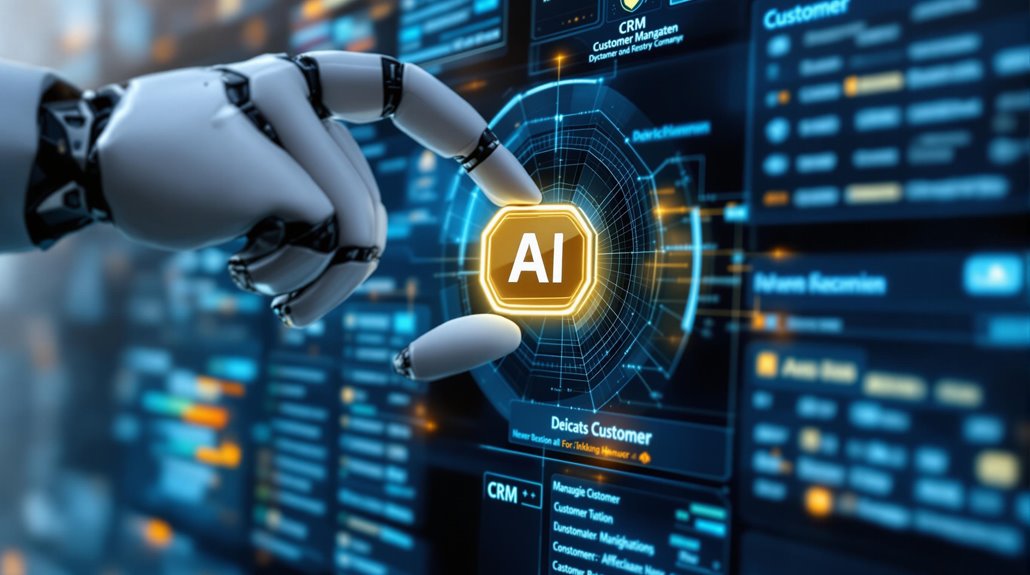AI-driven CRMs play a vital role in advancing customer management by leveraging automated data processing and hyper-personalized customer interactions. These systems exponentially improve operational efficiency, create strategic insights, and boost market competitiveness. Automated lead management, AI-powered lead scoring, and predictive analytics lead to increased conversion and retention rates. This technology furthermore allows for targeted marketing campaigns and 24/7 customer support through AI chatbots. AI-driven CRMs represent the future of customer management, evolving continuously with enhancements in predictive analytics and automation – a subject well worth further exploration for more refined insights.
Key Takeaways
- AI-driven CRMs boost sales productivity and improve lead qualification processes through predictive scoring and AI-generated recommendations.
- Predictive analytics in AI-CRMs provide actionable insights into customer behavior, enabling customized interactions and proactive customer retention strategies.
- AI integration in CRM streamlines workflows, automates data entry, and provides immediate data insights, enhancing operational efficiency and decision-making.
- AI-powered CRM systems offer 24/7 customer support through chatbots, increasing customer engagement, satisfaction, and loyalty.
- AI-driven CRMs enhance security through predictive threat detection, automated incident responses, and advanced data protection strategies, ensuring robust customer data protection.
Understanding AI-Powered CRM Systems
By automating routine tasks, businesses can dedicate more time to strategic initiatives, offering their employees a newfound sense of independence. Furthermore, by automating lead management, companies can improve their conversion rates and effectively avoid any oversight of potential leads (automated lead management).
Moreover, improved sales forecasting, a standout feature of AI-powered CRM systems, offers immediate, practical decision-making insights. AI’s predictive analytics enable businesses to strategize effectively by forecasting sales trends, predicting future purchases, identifying churn risk, and spotting upsell opportunities. This AI-driven forecasting provides precise, data-backed predictions that guide business decisions. Additionally, with the integration of AI, businesses can now ensure streamlined data management, reducing the chances of human errors and discrepancies (reducing the chances of human mistakes and discrepancies).
Individualization is at the heart of customer satisfaction. AI-powered CRM systems analyze customer data to tailor marketing campaigns, product recommendations, and communications to personal preferences. By delivering customized customer experiences, businesses can considerably improve sales and customer satisfaction.
Lastly, AI-driven insights provide an extensive understanding of customer behavior. By analyzing vast datasets, these systems extract practical insights and identify patterns in customer behavior. This continuous AI learning process refines algorithms over time, improving performance and reducing errors, thereby advancing customer relationship management. In addition to these, AI-powered CRMs like Salesforce Sales Cloud and Pipedrive even offer features like next-actioning recommendations and AI Sales Assis,tant respectively, making them a go-to solution for businesses looking for an all-in-one platform (all-in-one platform).
Business Benefits of AI-Driven CRM
In the fast-paced business landscape, the benefits of AI-driven CRM systems are multifaceted, spanning across operational efficiency, data analysis, customer experience, and strategic financial gains.
AI-driven CRMs streamline workflows, automate routine tasks, and provide round-the-clock customer support. This not only improves efficiency but also allows teams to focus their efforts on strategic initiatives, thereby increasing productivity. By leveraging sales automation tools, businesses are empowered to focus on higher-value tasks and strategic engagements, further optimizing sales efficiency.
Moreover, these systems utilize predictive analytics to provide valuable sales forecasting and create tailored marketing materials. They also optimize sales processes and facilitate data-driven decision-making, leading to proactive business planning. With a feature like sentiment analysis, these systems can also evaluate the emotional tone in customer feedback, allowing businesses to align their responses with customer emotions, hence enhancing customer satisfaction.
Furthermore, AI-driven CRMs foster improved customer experience through hyper-customized interactions, timely customer support, and personalized recommendations. They also reduce customer churn and build long-term loyalty.
Strategically, AI-powered CRMs offer cost savings, prepare businesses for future technological advancements, guarantee robust data security, and provide strategic insights. This not only supports market competitiveness but also facilitates freedom in decision-making and strategic planning.
In addition to these benefits, AI chatbots present in AI-driven CRM systems offer 24/7 personalized responses to customer inquiries, leading to improved customer satisfaction and loyalty.
| Benefits | Description | Impact |
|---|---|---|
| Operational Efficiency | Streamlined workflows and automated tasks | Improved productivity |
| Data Analysis | Predictive analytics and tailored marketing | Informed decision-making |
| Customer Experience | Customized interactions and timely support | Increased loyalty |
| Financial Gains | Cost savings and strategic insights | Improved competitiveness |
Next, we will examine the key AI features in CRM systems.
Exploring Key AI Features in CRM

In evaluating the key AI features in CRM, it is essential to contemplate the impact of predictive analytics, the implementation of automated email responses, and the utilization of AI-powered lead scoring. Predictive analytics offer profound insights into customer behavior, enabling accurate sales forecasts and risk identification. Additionally, chatbots, another feature of AI in CRM, have considerably reduced response times to customer inquiries, providing 24/7 support and enhancing customer service (24/7 support capabilities).
Automated email responses and AI-powered lead scoring improve efficiency, allowing for streamlined communication and accurate prospect prioritization. Moreover, the integration of AI in CRM leads to the automation of mundane tasks like data entry, allowing sales teams more time to focus on strategic initiatives (automation of routine tasks). Furthermore, CRM systems that incorporate AI can facilitate the identification of touchpoints with customers, resulting in enhanced customer journeys and more effective lead generation (identifying automation opportunities).
Predictive Analytics Impact
Predictive analytics, which utilizes the power of Artificial Intelligence, has emerged as a game-changing feature in Customer Relationship Management (CRM) systems. This powerful tool takes advantage of historical data within CRM systems to make accurate predictions about future customer behaviors, preferences, and potential churn, enabling businesses to respond proactively and efficiently.
- Sales Forecasting and Optimization: Predictive analytics uses AI to analyze historical data and recent sales trends. This allows businesses to adapt their sales strategies based on anticipated customer behavior. Not only does this improve sales forecasting accuracy, but it also helps to optimize the sales process by streamlining automated workflows. Moreover, predictive analytics can help businesses identify upsell and cross-sell opportunities, thereby increasing overall revenue (increased revenue opportunities(#1)). By leveraging CRM systems, organizations can better streamline the follow-up process, leading to higher conversion rates (CRM systems streamline(#3)).
- Enhanced Customer Retention: AI-driven predictive analytics analyze CRM data to identify customers at risk of churn. This enables businesses to engage with customers proactively, tailoring their retention efforts based on the customers’ behavior, preferences, and engagement levels.
- Process Optimization: Implementing predictive analytics in CRM systems aids in automating routine tasks and improving workflow efficiency. This is achieved by identifying bottlenecks in the sales process and recommending improvements.
- Data-Driven Decision Making: AI provides actionable recommendations based on immediate data analysis, facilitating faster and more precise decisions in sales and marketing. This continuous refinement of predictions and business processes leads to significant improvements in comprehensive performance. Additionally, AI can assist in data management by automating data entry and cleansing, ensuring accurate customer information and insights (accurate customer information(#2)).
Automated Email Responses
One significant advancement in CRM systems, building upon AI’s predictive capabilities, is the rise of automated email responses. This feature utilizes AI’s natural language processing and machine learning algorithms to generate contextually meaningful responses to incoming emails. This automation improves efficiency by reducing manual labor and minimizing errors, especially in routine correspondence.
The integration of this feature within CRM systems guarantees instantaneous updates and accurate records, contributing to enhanced customer management. Furthermore, AI-powered responses can be tailored to a specific tone and style, thereby improving customer engagement. The continuous learning capability of these AI autoresponders enables them to elevate the quality of their responses progressively.
AI-powered email automation enhances productivity and boosts customer satisfaction by sending timely and personalized responses. It efficiently handles large amounts of emails, showing its ability to scale and adapt to different business needs. These tools optimize communication, allowing businesses to focus on strategic tasks rather than routine ones, streamlining processes, and improving efficiency.
By automating repetitive tasks, teams can dedicate more time to important projects, improving overall performance. AI integration also supports better lead conversion and provides valuable insights for more innovative sales strategies. Additionally, these systems prioritize security and privacy by following data protection rules, reducing the risk of data breaches, and ensuring trust.
Moreover, AI lead scoring systems offer scalability benefits, as they can effortlessly manage large volumes of data, allowing businesses to grow without performance degradation. This incredible feature of scalability ensures consistent performance and accuracy, regardless of the lead volume, which is crucial for companies with expanding customer bases.
AI-Powered CRM Solutions
Artificial intelligence (AI) is revolutionizing customer relationship management (CRM), offering advanced capabilities like predictive analytics, automation, and natural language processing. These tools streamline processes, improve customer engagement, and enhance overall efficiency.
AI-powered CRM systems utilize chatbots, predictive lead scoring, and sales analytics to transform how businesses interact with customers. They reduce missed opportunities and optimize workflows by automating tasks, offering actionable insights, and personalizing customer experiences. These tools enable companies to focus on growth rather than mundane administrative work.
With features designed to integrate seamlessly into existing business operations, AI-powered CRM systems provide a cost-effective way to improve productivity and drive a potential 10% sales increase. By leveraging AI, businesses gain a competitive edge, delivering tailored solutions that meet customer needs while enhancing operational efficiency.
AI in CRM for Enhanced Customer Service

As we investigate the domain of AI in CRM for improved customer service, it becomes evident that artificial intelligence is radically transforming the way businesses interact with their clients. AI enables organizations to deliver an exceptional level of service, fueling customer satisfaction and loyalty.
- Hyper-Customization: AI powers customization, tailoring interactions to distinct customer preferences. This improves the customer experience, fosters more substantial relationships, and promotes customer retention. Additionally, AI’s ability to track interactions and personalization can be leveraged for lead scoring, which helps prioritize potential customers based on their engagement and likelihood to convert.
- Efficiency and Availability: AI automates routine tasks, freeing human agents to handle more complex issues. Additionally, AI-powered chatbots provide round-the-clock customer support, delivering instant responses to inquiries. With the advent of AI, the response times to customer inquiries have vastly improved, enhancing the overall customer service experience (enhanced response times).
- Unified Data and Predictive Analytics: AI organizes and analyzes complex CRM data, predicting customer behavior and facilitating data-driven decision-making. This allows businesses to anticipate client needs, deliver proactive service, and enhance customer satisfaction.
- Cost-Effective: AI-driven CRM solutions reduce operational costs by automating repetitive tasks and reducing the need for human intervention, making customer service more economical.
AI Impact on Customer Loyalty
The groundbreaking power of AI significantly impacts customer loyalty, reshaping traditional strategies and crafting more effective, tailored initiatives. AI’s sophisticated algorithms analyze customer data, crafting customized experiences that foster stronger relationships and improve loyalty. These experiences are then deployed in actual time, ensuring dynamic responsiveness to customer behavior.
Advanced predictive analytics allow businesses to identify at-risk customers and predict churn, enabling the formulation of proactive retention strategies. This, coupled with AI’s ability to streamline communication, makes for timely and relevant interactions that build loyalty. AI-driven customization also comes into play, with automated offer recommendations improving customer engagement.
AI also transforms customer service, with 24/7 support availability and efficient issue resolution through AI-powered chatbots. These tools improve customer satisfaction and loyalty by providing swift, individualized responses. Additionally, AI’s data-driven insights allow for effective customer segmentation, targeting high-value customers to bolster loyalty further.
Efficient Data Analysis With AI

Building on AI’s impact on customer loyalty, we can further investigate how AI contributes to efficient data analysis. AI technology in CRM systems offers a dynamic approach to data analysis, transcending traditional methods and offering a matchless edge in customer management.
- Automated Data Entry & Management: The application of AI in CRM automates data entry, reducing manual labor and chances of inaccuracies. AI systems further manage large volumes of customer data, making it not only accessible but actionable, ultimately fostering freedom of data usage.
- Data Cleaning & Enrichment: AI maintains high data quality by consistently updating and enriching customer data, guaranteeing clean and accurate data that serves as a solid foundation for analysis.
- Immediate Data Analysis: AI-powered CRMs provide immediate data analysis, offering instant insights that aid swift and informed decision-making processes.
- Unified Data Foundation: AI guarantees data consistency and integrity by maintaining a unified data foundation across the CRM system.
These benefits allow businesses to utilize data more effectively, gaining deep insights into customer behaviors, making data-driven decisions, and creating individualized engagement strategies. The result is improved operational efficiency, better decision-making, and enhanced customer loyalty.
Predictive Analytics in AI-Driven CRM
Given the increasingly competitive business landscape, predictive analytics in AI-driven CRM has become pivotal in making strategic decisions. AI-driven predictive analytics in CRM platforms integrate machine learning algorithms to analyze historical customer data and predict future behavior. This not only enables data-driven decision-making but also improves lead qualification through predictive scoring.
| Benefits | Applications |
|---|---|
| Data-Driven Decision Making | Sales Optimization |
| Improved Lead Qualification | Customer Segmentation |
| Enhanced Sales Forecasting | Marketing Individualization |
AI-driven CRM identifies patterns in customer behavior, presenting opportunities for sales forecasting and churn prediction. AI models continuously learn from new data inputs, refining their predictions and optimizing processes. Immediate data processing delivers practical insights, facilitating automated process optimization.
Looking ahead, the integration of generative AI and advanced AI-powered insights will transform predictive analytics in CRM. The promise of increased automation and highly tailored customer experiences across all touchpoints, coupled with continuous improvement in prediction accuracy, signifies the revolutionary potential of predictive analytics in the domain of CRM.
AI-Generated Recommendations for Customers

In Customer Relationship Management (CRM), AI-generated recommendations serve a pivotal role in enhancing the customer experience and improving sales efficiency. Leveraging vast amounts of customer data, AI algorithms can generate individualized suggestions, thereby offering a more tailored and satisfying customer experience. This not only impacts the sales process considerably by prioritizing high-value opportunities but also provides a competitive edge in the saturated marketplace.
AIs Personalized Suggestions
Utilizing the power of artificial intelligence, contemporary CRM systems have transcended traditional boundaries, offering highly tailored recommendations for customers. These AI-powered systems analyze a wide range of customer data, employing machine learning algorithms to deliver individualized experiences based on distinctive customer behaviors and preferences.
- Enhanced Product Recommendations: AI-driven CRMs improve the quality and relevance of product suggestions. They make dynamic, authentic time adjustments based on customer interactions, leading to increased sales and customer retention.
- Tailored Customer Engagement: By analyzing customer data, AI-powered CRM systems offer predictive customization, dynamic segmentation, and tailored content recommendations. They even provide proactive customer support through AI-powered chatbots.
- AI-Driven Customization Techniques: AI-powered CRMs use a blend of content-based systems, hybrid recommendation systems, knowledge-based systems, and collaborative and ensemble filtering to generate precise and highly individualized suggestions.
- Authentic-World Applications: AI-driven customization is revolutionizing industries, from supply chain management to retail and e-commerce, by predicting demand, optimizing inventory, and enhancing customer satisfaction with tailored recommendations.
Impacting Sales With AI
Notable advancements in artificial intelligence have dramatically reshaped the sales landscape, with AI-generated recommendations playing a pivotal role in enhancing client interactions. AI integration in Customer Relationship Management (CRM) systems can significantly elevate sales productivity by up to 35% while increasing pipeline conversions by 56% on average.
Utilizing AI-powered CRMs, businesses have witnessed improved sales forecasting, with 89% of companies reporting greater accuracy. This technology also plays a role in providing individualized customer experiences, a benefit acknowledged by 69% of marketing leaders, and reduces lead response time by a substantial 61%.
Companies actively embracing AI within their sales processes have observed a 50% surge in leads and appointments. AI-generated recommendations have the potential to increase customer engagement rates by 74% while reducing call time by 60-70%. This efficiency leads to considerable cost reductions of 40-60%.
In the domain of future CRM strategy, half of all companies will need to modernize their CRM systems by 2026 to utilize new AI capabilities. AI adoption in CRM use is pivotal to remaining competitive, with 97% of organizations recognizing this necessity. Consequently, AI-driven CRMs are transforming customer management, paving the way for advanced individualized interactions and improved sales performance.
AIs Role in Reducing Customer Churn
Consistently, AI is playing a pivotal role in reducing customer churn across different industries. The integration of AI in CRM is transforming customer management, providing businesses with powerful tools to combat churn.
- AI-Predictive Models: By integrating machine learning algorithms with customer data, AI-driven predictive models can accurately identify customers at risk of churn. These models allow businesses to proactively engage with these customers, implementing targeted interventions and enhancing retention strategies.
- AI-Enhanced CRM Capabilities: AI-infused CRMs provide immediate predictive analytics, enabling businesses to understand and act upon customer behavior patterns. These insights allow companies to prioritize leads based on historical success, predict customer lifetime value, and align data across functions for dynamic targeting.
- Generative AI in Customer Retention: Generative AI designs customized customer experiences, uncovering hidden insights from customer data to predict future behaviors. These predictions, coupled with immediate engagement tools like AI-powered chatbots, foster loyalty and reduce churn.
- AI-Driven Customer Retention Strategies: By strategically using AI in CRM, businesses can identify at-risk customers, suggest individualized re-engagement strategies, and provide tailored follow-ups. These creative strategies significantly reduce churn rates, driving long-term business growth.
AI and Enhanced CRM Security

In the domain of Customer Relationship Management (CRM), the integration of Artificial Intelligence (AI) has creatively improved security measures. By undertaking a critical role in threat detection, AI bolsters security through data protection strategies that effectively avert data breaches. As we advance in our discussion, we will examine the multifaceted approach AI provides in mitigating security risks, understanding behavioral patterns, and predicting potential threats to guarantee a secure and efficient CRM environment.
AI’s Role in Security
Leveraging advanced technologies such as machine learning and predictive analytics, artificial intelligence (AI) plays a crucial role in enhancing the security of CRM systems. It does this through multiple methods, allowing for robust security measures that can adapt to evolving threats.
- AI-Driven Threat Detection: AI-based systems analyze historical threat data, identifying and mitigating new threats in actual time. With advanced analytics, they predict potential security breaches, guaranteeing seamless security integration within the CRM system.
- Automated Incident Response: AI automates defensive actions against cyber attacks, isolating compromised sections to protect the comprehensive system. Continuous monitoring and AI-driven analytics facilitate quick responses and intelligent decision-making.
- Predictive Analytics in Security: AI uses historical data to anticipate future threats, allowing for proactive measures. Advanced predictive models forecast security risks, with data analysis of past breaches informing future preventive strategies.
- AI-Driven Identity and Access Management: AI-powered IAM detects unauthorized access attempts by analyzing atypical user behaviors and location changes. Advanced access controls guarantee that only authorized personnel access sensitive data, and continuous monitoring detects potential security breaches in real-time.
In essence, AI’s role in securing CRM systems is multifaceted, contributing to advanced threat detection, incident response, predictive security analytics, and identity management.
Data Protection Strategies
Navigating the online environment, businesses must prioritize data protection strategies to improve the security of their AI-driven CRM systems. The initial line of defense is data minimization and anonymization. This means only collecting the information you really need and using tools, including AI, to remove personal details from the data. This helps keep the data safer if there’s a breach and makes sure the information is still valid.
Encryption and access controls form another vital layer of protection. Data, both at rest and in transit, should be encrypted, and access should be strictly controlled. Regular key updates, role-based access controls, and multi-factor authentication contribute to a robust security framework.
Transparency and consent are also essential in data protection. Businesses should maintain transparency with customers regarding data collection, processing, and usage and obtain explicit consent. Thorough data usage policies and opt-out options improve customer freedom.
Lastly, compliance with data privacy regulations and regular security audits guarantee adherence to legal requirements and help identify vulnerabilities. Integrating robust threat detection mechanisms, incident response plans, and careful vendor risk management further fortifies AI-driven CRM security.
Preventing Data Breaches
As businesses utilize the power of AI-driven CRMs, their responsibility to protect sensitive customer data from breaches takes precedence. AI provides improved security measures to prevent data breaches, which is essential in the era of rising cyber threats.
- AI-Powered Threat Detection: AI algorithms identify cyber-attack patterns, enabling proactive security responses. This includes continuous monitoring of user behavior, prediction of future threats, and integration of threat intelligence tools.
- Improved Security Measures: AI-CRMs employ robust encryption, regular security audits, AI-driven Security Operations Centers, intrusion detection systems, and automated defensive responses.
- Access Control and Verification: AI-CRMs enforce strict access controls and multi-factor authentication. AI-powered Identity and Access Management solutions alert for atypical user behaviors while clear guidelines uphold data protection standards.
- AI-Driven Incident Response: AI augments incident response with predictive problem-solving capabilities, automated isolation of compromised sections, continuous adaptation to threats, and integration of AI in incident response processes.
Frequently Asked Questions
How Does AAI-driven CRMS Integrate With Existing Business Technology and Software?
AI-driven CRMs integrate with existing business technology via seamless data exchange and API support, automating data entry, unifying data platforms, and ensuring authentic-time data synchronization. This consequently enhances software capabilities and optimizes customer management.
What Are the Required Technical Skills to Operate an AI-powered CRM System?
Operating an AI-powered CRM requires knowledge of data science, programming, AI and ML concepts, IT infrastructure, and system administration. Understanding AI ethics, compliance regulations, and user training are also essential for effective management.
How Can Small Businesses Afford and Benefit From AI-powered CRM Systems?
AI-powered CRMs offer small businesses affordable scalability, cost savings, and operational efficiency. Furthermore, they provide competitive advantages like improved customer engagement, predictive insights, and advanced data analytics that drive superior customer management.
What Are the Potential Drawbacks or Limitations of AI-powered CRM Systems?
AI-powered CRMs present potential drawbacks, including data privacy risks, algorithmic biases, high implementation costs, strategic misalignment, and over-reliance on technology, which can depersonalize customer interactions and create operational challenges.
How Does AI in CRM Comply With Data Privacy Regulations and Legislation?
AI in CRM complies with data privacy regulations through measures like data minimization, encryption, access controls, and a robust governance framework. It also guarantees regulatory compliance, like GDPR and CCPA, through transparent practices and regular audits.
Leveraging AI for Smarter Customer Management LaunchedConclusion
In effect, AI-driven CRM systems have emerged as pivotal tools in customer management, delivering business value through predictive analytics, individualized customer recommendations, churn reduction, and improved security. The adage “knowledge is power” holds, as these systems provide critical insights for businesses. Consequently, the integration of AI in CRM systems is not just a groundbreaking trend but a necessary stride toward achieving superior customer service and comprehensive business growth.

Erik Remmel is a co-founder of Launched, a platform that helps businesses grow through AI-powered marketing, automation, and lead generation. He focuses on building scalable systems that convert cold leads into customers while streamlining operations with smart, AI-driven workflows.

